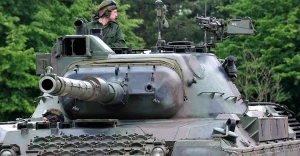
Danilov assumes what Russia would look like after its collapse
Oleksiy Danilov, Secretary of the NSDC, believes that the West should let go of any illusions that Russia will exist in its current form
Oleksiy Danilov, Secretary of the National Security and Defense Council of Ukraine, stated this in an interview with Bild.
"The West needs to understand that Russia is divided and there is no force that can keep it united. We need to be prepared for this. We have been discussing this for a year. Remember that the changes happening in Russia cannot be stopped," he stated.
He explained that the Kremlin "cannot control such a vast territory, it simply doesn't have the means." Therefore, the West should let go of any illusions that Russia will remain as it is currently.
It is mentioned that Ukraine analyzed how the Russian regions responded during the Wagner PMC uprising, and it revealed that "Russia is not a unified country."
"We have studied how the regions reacted during Prigozhin's rebellion. Based on our analysis, we can predict what Russia will look like after it falls apart. Tatarstan will become independent, and Dagestan will be a separate country unrelated to Russia. These regions are essentially colonies of the Russian Federation," Danilov explained.
Prigozhin's mutiny, agreements with Lukashenko, and relocation to Belarus
For several months, the conflict between Wagner PMC financier Yevgeny Prigozhin and the Russian Ministry of Defence continued, but the situation escalated sharply on the evening of 23 June.
Then Russian troops allegedly launched a missile attack on the Wagner PMC base. The leader of the Wagner group, Yevgeny Prigozhin, announced a "march of justice" and said that 25,000 mercenaries were marching on Moscow after the Russian leadership failed to comply with the demand to extradite Defence Minister Sergei Shoigu and Chief of the General Staff Valery Gerasimov.
On Saturday, 24 June, Wagner's men also took control of Voronezh, in addition to the central part of Rostov-on-Don, where they had been camped around the headquarters of the Southern Military District since the evening of 23 June. Their columns, diverted from the border with Ukraine, were moving towards Moscow. Shoigu's military aviation and artillery tried to stop them. The last time Wagner's PMC units were spotted was in the Lipetsk region of Russia. And in the Russian capital itself, firing points were being built at the entrance, trenches were being dug, and all security forces were being mobilised.
However, on the evening of 24 June, the press service of the self-proclaimed President of Belarus, Alexander Lukashenko, released a statement saying that the head of the Wagner PMC was ready to stop the movement of his mercenaries' convoys, which were already approaching Moscow, and to reach an agreement with the Kremlin. Prigozhin allegedly agreed on this during a conversation with Lukashenko.
Instead, the PMC financier said that before reaching 200 km to Moscow, the Wagner soldiers stopped moving and returned to their field camps: "We have travelled for a day - before reaching 200 kilometres to Moscow. During this time, we have not shed a single drop of blood. Now the moment has come when blood may be shed. Therefore, realising the full responsibility for the fact that Russian blood will be shed - on one side - we are turning our columns around and heading back to the field camps according to the plan."
Subsequently, Prigozhin and all his men left the headquarters of Russia's Southern Military District. Russian dictator Vladimir Putin promised that Prigozhin would be able to go to Belarus, and Russia would close the criminal case against him.
On 26 June, Russian President Vladimir Putin made a speech in which he commented on Prigozhin's mutiny - the Russian president gave the Wagner PMC fighters three options for future actions.
In turn, Yevgeny Prigozhin stated that the main goal of the mutiny was "to prevent the destruction of the Wagner PMC, not to remove the government in the country" and called it a "march of justice". He also claimed that the attack on Moscow had stopped because the mercenaries "did not want to shed much blood".
On 27 June, Russia's Federal Security Service announced the closure of a criminal case on armed rebellion involving the leader of the Wagner PMC, Yevgeny Prigozhin. The Russian Ministry of Defence claimed that Wagner's men would hand over heavy equipment to the Russian regular army.
On the same day, the self-proclaimed president of Belarus confirmed the arrival of Yevgeny Prigozhin in the country. According to him, the Wagner soldiers who arrived with him will not guard the Russian tactical nuclear weapons deployed there.
The United States believes that the deputy commander of the occupation forces, Sergei Surovikin, knew in advance about the plans of Wagner PMC leader Yevgeny Prigozhin to stage a coup in Russia. The Kremlin reacted to this statement and said that it was just "speculation".
On 29 June, the FT wrote that the commander of the Russian Aerospace Forces and deputy commander of Russian troops in Ukraine, General Sergei Surovikin, could have been arrested after Prigozhin's failed coup. This has been denied in Russia, including by Surovikin's daughter.
In an interview with The Washington Post, Ukrainian Armed Forces Commander-in-Chief Valeriy Zaluzhnyi said that due to the arrival of Wagner's PMC in Belarus, Ukraine may have to consider a new threat to its northern border and take appropriate measures.
For more information on the developments during the Wagner mutiny, please follow the link.
- News














































